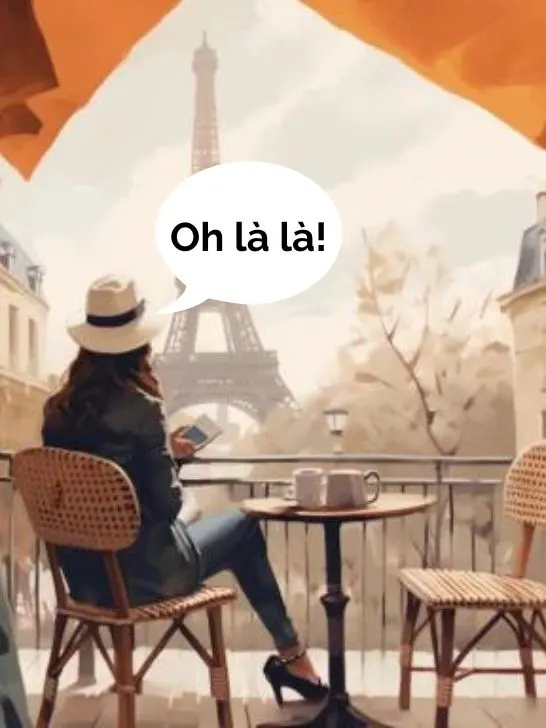Seen from abroad, the French expression “oh la la” is inseparable from the French language and the French, as the expression c’est la vie. Often used with a sexual connotation in the Anglo-Saxon world, “oh la la” is used in a radically opposite way in France.
Today, we will learn more about the meaning of “oh là là”, in France and in the world, but also about the different ways and situations in which it is used.
Table of Contents
What does the expression “oh la la” mean?
Meaning: Oh no, oh my, wow
Literally: Oh there there
Traditionally, the interjection “oh la la” is used by the French to convey a feeling of great surprise. This astonishment can be due to disappointment (“Oh la la! My son got a bad mark at school!”) or to a feeling of admiration (“Wow! I’m proud that he got his baccalaureate!”). In writing, the expression is used almost exclusively in exclamatory sentences to emphasize a feeling of surprise.

“Oh là là!”, written here in its correct form, is composed of two parts: the interjection “oh”, which is used to signify surprise, and “là là”, which can be written as the determiner (“la”) or with an accent as with the adverb (“là”). There is no connection between the two, since it is simply an interjection, to accentuate the feeling of surprise of “oh”. It is not uncommon to hear extended versions of the interjection to signify a strong degree of surprise (“oh là là là là là là!”).
Finally, be careful not to confuse the French “oh la la” with the one found in the United States or the United Kingdom. Unlike its use in the English-speaking world, the French interjection is never used with any naughty or sexual connotation, nor is it used as a noun or a nominal group.
Example
✅ It is not uncommon for Americans to use it this way:
“This dress is so ooh la la!”
❌ You will never see the “oh la la” used this way in France:
“Cette robe est tellement ooh la la !”
However, the interjection oh là là can have other meanings depending on the person and the situation in which the expression is used.
How to pronounce “oh là là”?
Despite what you may hear in the United States, “oh là là” is pronounced in a rather monotone in French. The first syllable is pronounced like the letter “o” while the last two syllables are pronounced like they are read. The official phonetic writing is thus very close to the expression: /o la la/.
In what situations do the French use “oh là là”?
Generally speaking, oh là là is used in two main ways in France:
- To show his astonishment
As we have seen above, oh là là is typically used to show surprise, whether positive or negative. In this case, the interjection replaces ruder expressions that are not adapted to the situation (in the family, at work, in public…).
Examples
“Oh là là ! Il fait un froid de canard aujourd’hui !” => version grossière : “Oh putain ! Il fait un froid de canard aujourd’hui !”
“Oh my god! It’s so cold today!” => rude version: “Oh fuck! It’s freezing cold today!”
“Oh là là ! J’ai encore raté mon bus !” => version grossière : “Oh merde ! J’ai encore raté mon bus !”
“Oh dear! I missed my bus again!” => rude version: “Oh shit! I missed my bus again!”
“Oh là là ! Ton plat est très bon !” => version alternative : “Wahou ! Ton plat est très bon !”
“Damn! Your dish is very good!” => alternative version: “Wow! Your dish is very good!”
- To indicate the use of irony
More generally, this interjection is used ironically to emphasize a joke or mockery. In this situation, the expression “oh là là” will be used as well by children and seniors, as by adults and teenagers. It is important to know that the French are extremely sarcastic!
Examples
“Oh là là ! Qu’est-ce que tu es doué !” (à quelqu’un qui vient de faire une erreur)
“Damn! How good you are!” (to someone who has just made a mistake)
“Oh là là ! Mais c’est qu’il fait beau aujourd’hui !” (alors qu’il pleut des cordes)
“Oh my! It’s such a beautiful day!” (while it is raining like crazy)
The different ways to write “oh la la”
It is useful to remember that there are two schools of thought when it comes to pronouncing the “oh” in the interjection “oh la la”. Some pronounce the “oh” as it is written (“oh”, “ô”, or “o”) while others prefer the “ou” sound (“ooh”, “ouh”, “oooh”). These two differences will greatly influence the transcription of the expression in writing.
The other part of the expression “la” can also be written in different ways. While French dictionaries seem to agree that the correct spelling is “là” (with a grave accent on the “a” like the demonstrative adverb), it can be found written in many ways in popular use, in addition to the traditional “oh là là”/”oh la la”.
So you will be able to find the written French expression:
- In one word : “Olala” ; “Oulala”
- In two words : ‘Oh lala’ ; “Ooh lala”
- In three words (and more) : “Ouh la la” ; “Ou la la” “Ooh la la” ; “Oh la la la la” ; “Ooh là là là là là là…”
Because yes. The more a French person is shocked by a situation, the longer the interjection will be. You can therefore find up to ten “là” if the speaker is very surprised by a news.
Example
“Oh là là ! Tu as renversé ton verre d’eau !” : action négative avec un faible niveau de gravité => peu de “là”.
“Whoops! You spilled your glass of water!” negative action with a low level of seriousness => few “là”.
“Oh là là là là là là ! Tu viens de casser le vase en porcelaine de mamie !” => action négative avec un fort degré de gravité => beaucoup de “là”.
“Damn it! You spilled your glass of water!” negative action with a high degree of severity => lot of “là”.
Expressions derived from “oh la la”
As time went by, “Oh là là” has been used in many different ways until it gave birth to French idiomatic expressions, some of which have a very specific meaning. Here are some of the most common derivatives of “oh là là” used by the French in everyday life.
- Ouh la !
The interjection “Ouh la”, although very close in its use to “oh la la”, has a strong negative connotation in the French collective imagination. It is used to signify a feeling of disgust or disapproval of an action.
Example
“Ouh la ! Qu’est-ce qu’il est en train de faire celui-là ?”
“Wow! What’s this one doing?”
- Roh la la !
Just like the transformation of “oh” into “ouh”, it is not uncommon to find “oh” becoming “roh”. Unlike the classic “oh la la”, “roh la la” is used to show that something is annoying.
Example
“Roh là là ! Le train est encore en retard !”
“Damn! The train is late again!”
- Oh la la chéri(e) !
The expression “oh la chéri!” or “oh là là chérie!” is generally used in two situations:
- To make your partner see reason: “Oh la la chérie ! Mais enfin, calme-toi !” (=Oh dear! Just calm down!)
- To express positive astonishment, “Oh la la chérie ! Mais tu as fait la vaisselle !” (=Oh my dear! But you did the dishes!) or to pay a compliment “Oh la chérie ! Mais que tu es belle ce soir !” (=Oh dear! How beautiful you look tonight!)
- Oh la vache !
To signify positive astonishment “Oh my dear! But you did the dishes!” or to pay a compliment “Oh dear! How beautiful you look tonight!”
The expression “oh la vache” (=Holy cow) has a similar meaning to the traditional “oh la la”. As a general rule, you will find this colloquial expression used to replace French insults such as “oh putin) (=oh fuck!) or “oh merde” (=oh shit!), either in the presence of children or in a situation that does not allow the use of these interjections (professional or family environment).
- Oh !
When “oh” is used alone, the speaker is usually expressing a deep sense of surprise at an everyday action: “Oh ! Mais ça va pas bien ?” (=Oh, what’s wrong?). Furthermore, a similar use of this interjection can be found in many other cultures.
The image of the expression “Oh la la” abroad
Seen from abroad (mainly in the Anglo-Saxon culture), the interjection “oh la la” is often considered a common expression, used by all French people; while some French people will tell you that they have never used this expression in their life.
The truth is that the interjection is still used by some people, but it is not nearly as widespread as one might think. It is even likely that, nowadays, Americans use it more than the French. In France, “Oh là là!” is more commonly used by very young children or elderly people. In a more familiar context, the majority of French people will prefer to use other more familiar terms to signify their astonishment.
The expression “Oh la la” in French popular culture
Indissociable from France and the French, the expression “oh la la” can be found in many cultural works in France.
A few months ago we introduced you to PNL, one of the most popular rap bands in France. Well, you have to know that one of their first tracks to have made the buzz was entitled “Oh Lala”!
In this track (which has almost 100 million views on YouTube), the two brothers punctuate their verses with the phrase “oh lala,” to indicate that their actions tend to shock their detractors and the people around them.
Finally, we find the French expression used in all sorts of ways, such as in the series of educational books for young children “Oh là là!” or in certain media dealing with French culture among foreigners (“Oh là là! Français” and “Oh La La I Speak French“). Did you like this explanation of the meaning of “Oh la la”? Let us know in the comment section! If you liked it, you can read our articles about the right use of mon ami and omelette du fromage.
Translated into English by Sacha


Catherine Laz
Monday 25th of April 2022
It would be useful to be able to link this really enlightening on LinkedIn. I work in advertising as a transcreator and the number of clients thinking they can speak French when they go "oooh lala" is unbelievable. I always have to correct them. They can't even see how sexist and even racist they appear.
Sacha
Monday 25th of April 2022
Hello Catherine, so next time, the best for you would be to share this great article with your clients :D And they won't make the mistake again after that!